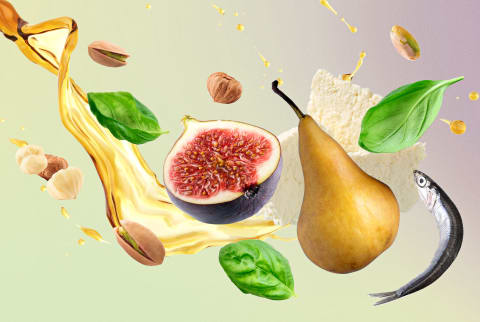While nonrestrictive, there are specific portions, or macros, that make up a standard Mediterranean diet. Macros, or macronutrients, are the three primary nutrients that make up a healthy diet. They are primarily broken into carbohydrates, proteins, and fats. A typical plate would contain half vegetables, one-quarter whole grains, and one-quarter protein, according to Smith. “About 10% of your protein may include healthy fats,” she adds. Dark, leafy greens, for example, contain a variety of antioxidants and carotenoids that help fight free radicals and reduce inflammation. They’re also generally high in vitamins and minerals. To get these benefits, add spinach, broccoli, kale, and arugula to your plate, just to name a few. Another simple way to consume a large variety of vegetables is with a healthy side salad. In true Mediterranean fashion, integrative medicine doctor Bindiya Gandhi, M.D., suggests eating “traditional Greek salad made with tomatoes, cucumber, green peppers, onions, olives, and feta.” Other vegetables to include: carrots, Brussels sprouts, garlic, cauliflower, bell peppers, artichokes, zucchini, eggplant, squash, mushrooms, celery, fennel, cabbage, leeks, beets, potatoes, sweet potatoes, turnips, etc. Unrefined whole grains “are a healthy source of fiber, protein, and micronutrients including magnesium, zinc, and copper,” Gandhi says. This can include healthy grains like quinoa, barley, brown rice, and farro—to name a few. Lentils also fit into this category. Other whole grains to include: buckwheat, bulgur, millet, oats, polenta, rice, wheat berries, whole grain breads, whole grain pasta, chickpeas, beans, peas, and peanuts. “You can enjoy low-fat dairy like Greek yogurt, goat milk, feta cheese, and goat cheese, sparingly,” Gandhi says. For those following a plant-based version of the diet, tofu, legumes, and nuts are also good sources of protein. Incorporating high-protein snacks, like hummus made of chickpeas, is an effective way to stay satiated between meals. Other proteins to include: beans, peas, peanuts, cottage cheese, Parmesan cheese, ricotta cheese, mozzarella. A few Mediterranean-diet-approved fats include fatty fish, olives, nuts (walnuts, almonds, pistachios, pine nuts, hazelnuts, cashews, etc.), avocados, and seeds (sesame seeds, sunflower seeds, pumpkin seeds, chia seeds, etc.) Extra-virgin olive oil and avocado oil are both great healthy fat options when it comes to preparing food or drizzling on salads. Other dessert options include fruit bowls, yogurt with honey, and olive oil cake, to name a few. You don’t have to deny your sweet tooth—just aim to avoid processed foods, refined grains, and excess sugars.



